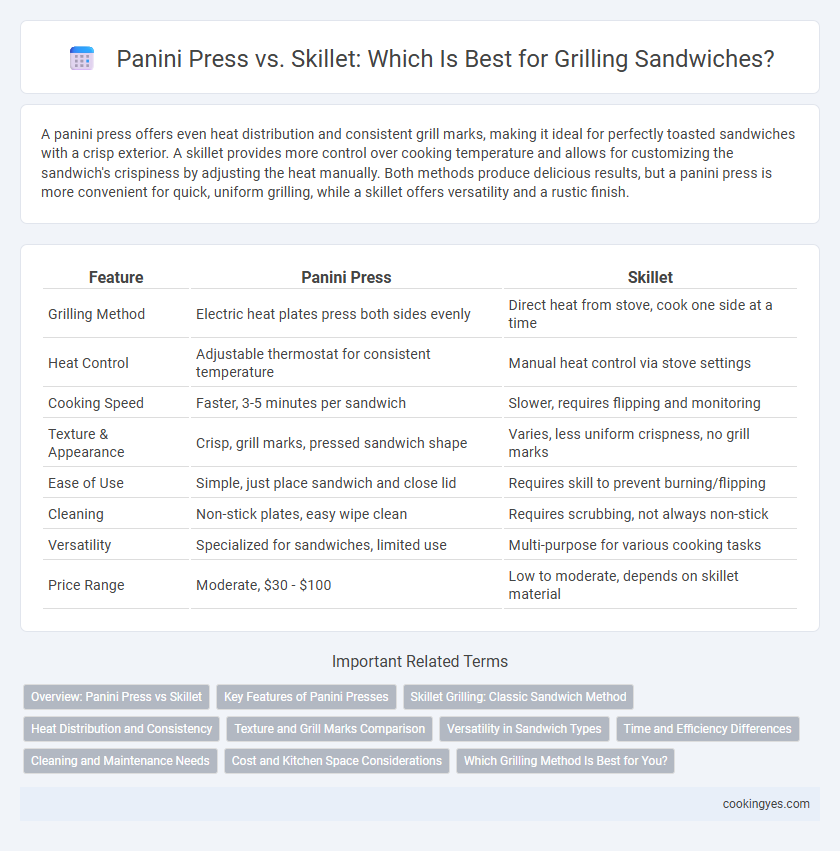A panini press offers even heat distribution and consistent grill marks, making it ideal for perfectly toasted sandwiches with a crisp exterior. A skillet provides more control over cooking temperature and allows for customizing the sandwich's crispiness by adjusting the heat manually. Both methods produce delicious results, but a panini press is more convenient for quick, uniform grilling, while a skillet offers versatility and a rustic finish.
Table of Comparison
| Feature | Panini Press | Skillet |
|---|---|---|
| Grilling Method | Electric heat plates press both sides evenly | Direct heat from stove, cook one side at a time |
| Heat Control | Adjustable thermostat for consistent temperature | Manual heat control via stove settings |
| Cooking Speed | Faster, 3-5 minutes per sandwich | Slower, requires flipping and monitoring |
| Texture & Appearance | Crisp, grill marks, pressed sandwich shape | Varies, less uniform crispness, no grill marks |
| Ease of Use | Simple, just place sandwich and close lid | Requires skill to prevent burning/flipping |
| Cleaning | Non-stick plates, easy wipe clean | Requires scrubbing, not always non-stick |
| Versatility | Specialized for sandwiches, limited use | Multi-purpose for various cooking tasks |
| Price Range | Moderate, $30 - $100 | Low to moderate, depends on skillet material |
Overview: Panini Press vs Skillet
A panini press offers consistent, even heat and pressing capabilities, creating crisp, defined grill marks and a uniform sandwich texture. A skillet provides versatile cooking options with more control over heat distribution and the ability to customize pressure but may require flipping and manual pressing for even grilling. Both methods enhance sandwich flavors; choice depends on desired texture and convenience.
Key Features of Panini Presses
Panini presses feature adjustable temperature controls and evenly heated grill plates that create consistent grill marks and ensure uniform cooking of sandwiches. Their hinged design applies even pressure to compress sandwiches, enhancing texture and melting fillings perfectly. Many models also include non-stick surfaces for easy cleanup and floating hinges to accommodate varying sandwich thicknesses.
Skillet Grilling: Classic Sandwich Method
Skillet grilling offers precise control over heat and allows for an even, golden-brown crust on sandwiches, enhancing flavor and texture. Unlike a panini press, a skillet enables manual adjustment, making it ideal for traditional, crusty breads and fillings that require gentle, intermittent heat. This method also allows adding butter or oil directly to the pan, enriching the sandwich's taste with a crispy, savory finish.
Heat Distribution and Consistency
A panini press offers even heat distribution through its dual heated plates, ensuring consistent grilling on both sides of the sandwich simultaneously. In contrast, a skillet requires manual flipping, which can result in uneven cooking and varying heat exposure. The panini press's controlled temperature and pressure provide uniform browning and melting, enhancing sandwich texture and flavor consistency.
Texture and Grill Marks Comparison
A panini press delivers consistent, even grill marks and a uniform crispy exterior due to its heated top and bottom plates, enhancing the sandwich's visual appeal and texture. In contrast, a skillet offers more control over heat distribution and allows for varied textures, such as a crisp crust with softer, less compressed interiors. The panini press produces pressed, thin sandwiches with defined grill lines, while the skillet can create a rustic, uneven grill pattern with a chewier bite.
Versatility in Sandwich Types
A panini press excels in grilling pressed sandwiches like paninis and melts, providing even heat and characteristic grill marks. A skillet offers greater versatility, accommodating various sandwich types such as grilled cheese, open-faced sandwiches, and thicker breads by allowing customized heat and pressure control. Choosing between a panini press and skillet depends on the desired sandwich variety and preparation style.
Time and Efficiency Differences
Panini presses offer faster and more consistent grilling times due to their dual heated plates that press the sandwich evenly from both sides simultaneously. Skillets require more active monitoring and flipping, often taking longer to achieve uniform toasting and melting. Using a panini press enhances efficiency by reducing hands-on time and delivering evenly heated sandwiches quickly.
Cleaning and Maintenance Needs
A panini press offers a non-stick surface that simplifies cleaning, often requiring just a quick wipe after use, while its removable plates provide easy access for deeper maintenance. Skillets, however, may accumulate food residue and require thorough scrubbing and seasoning, particularly if cast iron is used, to prevent rust and ensure longevity. Regular upkeep of both tools maintains optimal performance but the panini press typically demands less intensive cleaning.
Cost and Kitchen Space Considerations
A panini press offers a compact design, making it ideal for small kitchens but often comes with a higher upfront cost compared to a versatile skillet. Skillets provide a budget-friendly option with multipurpose use, saving cost by eliminating the need for an extra appliance and accommodating various cooking techniques beyond grilling sandwiches. Choosing between the two depends on balancing initial investment against available kitchen space and desired functionality.
Which Grilling Method Is Best for You?
A panini press offers even heat distribution and consistent grill marks, perfect for pressing sandwiches uniformly and melting cheese quickly. Skillets provide more versatility, allowing control over heat intensity and the ability to customize sandwich textures by adjusting cooking time. Choosing between a panini press and a skillet depends on your preference for convenience and style versus flexibility and control in sandwich grilling.
Panini press vs skillet for sandwich grilling Infographic

 cookingyes.com
cookingyes.com